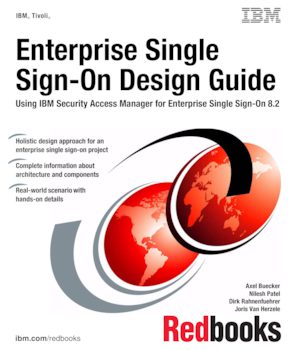
Published on 11 September 2012
Read in Google Books Order hardcopy
Share this page:
ISBN-10: 0738437034
ISBN-13: 9780738437033
IBM Form #: SG24-7350-02
Authors: Axel Buecker, Nilesh Patel, Dirk Rahnenfuehrer and Joris Van Herzele
Abstract
Everyone feels the pain of too many passwords to remember. Everyone can relate to the security exposure of weak passwords, chosen for convenience. And, everyone can relate to passwords placed in proximity to the workstation for a quick reminder. Unfortunately, that note can allow more than the intended user into the system and network. The average user today often has four or more passwords. And, security policies that focus on password complexity and password-change frequency can cause even more difficulty for users.
This IBM® Redbooks® publication introduces IBM Security Access Manager for Enterprise Single Sign-On 8.2, which provides single sign-on to many applications, without a lengthy and complex implementation effort. Whether you are deploying strong authentication, implementing an enterprise-wide identity management initiative, or simply focusing on the sign-on challenges of a specific group of users, this solution can deliver the efficiencies and security that come with a well-crafted and comprehensive single sign-on solution.
This book is a valuable resource for security officers, administrators, and architects who want to understand and implement an identity management solution in a medium-scale environment.
This book is an update to the existing SG24-7350-01.
IMPORTANT: Please note that in the latest version of SAM ESSO, the following two capabilities described in this SAM ESSO Redbooks publication have been removed:
-Virtual appliance support
-Mobile (iPad) support
Table of Contents
Part 1. Architecture and design
Chapter 1. Business context
Chapter 2. Single sign-on architecture and component design
Chapter 3. Solution design and management
Part 2. Customer environment
Chapter 4. Overview of scenario, requirements, and approach
Chapter 5. Base installation and configuration
Chapter 6. Password self-services implementation
Chapter 7. Strong authentication using RFID
Chapter 8. Roaming desktop implementation
Chapter 9. Implementing operational requirements
Part 3. Appendixes
Appendix A. Renewing the Secure Sockets Layer certificate used by the IBM HTTP Server
Appendix B. Advanced profiling
Appendix D. Configuring strong authentication